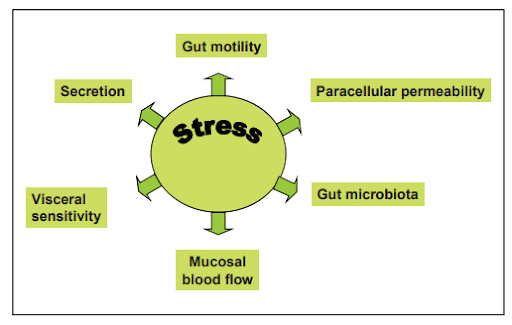Gut Health: The Secret to Professional Success

Can you eat your way to success? The gut can considerably influence a person’s mood and mental state. What you eat during your workday will have a significant impact on your sense of well-being and your productivity and performance. It doesn’t have to be complicated. Just a few simple switches can make a big difference. Let’s look at how gut health could affect your career and how to make the workplace a healthier place for everybody!
Let’s kick things off with where digestion begins… Can you guess where that is?
The Brain & Mouth
You might think: I get how the mouth is involved, but what about the brain? Well, the brain can influence digestive function through emotional and cognitive factors. Did you know stress, anxiety, and other emotional states can trigger changes in gut motility, blood flow, and secretion of digestive juices, leading to symptoms such as abdominal pain, bloating, diarrhea, or constipation? Similarly, when you are at rest, the anticipation of food, as well as sensory experiences such as sight, smell, and taste, can stimulate digestive processes through neural pathways involving the brain.

fig 1: How stress influences the gut (source: Stress and the gut: pathophysiology, clinical consequences, diagnostic approach and treatment options)
Let’s dive a little deeper! Why does stress cause all of this?
When you’re stressed, your body interprets it as a signal that you’re not in a safe environment. From an evolutionary perspective, situations that cause stress often pose threats to our survival, like encountering a dangerous animal while hunting or being attacked by an enemy in battle for example. Stress hormones kick in to prepare us for survival by redirecting energy away from less urgent functions such as digestion, growth, and reproduction, and towards systems that are critical for survival and needed for immediate action.
As a result, even if you’re eating healthily, the absorption of nutrients becomes more challenging. You can find examples of these nutrients in the section below titled “Stomach Health & the Secret to Professional Success”.
How to measure your stress levels
Obviously, most people don’t hunt for dangerous animals or fear being attacked by enemies in battle. We get stressed by other stuff: deadlines, getting stuck in traffic, parenting responsibilities, bills, saving money for the future, perfectionism/fear of failure, loneliness, health challenges, constant exposure to emails, messages, notifications, and social media…
You get the idea.
Can stress hormones be measured? Not directly without laboratory testing, but there are some easy signs that indicate stress. Let’s begin with the simplest ones to observe:
- Breathing Exercise: Place one hand on your chest and the other on your belly. Pay attention to your breath. What sensations do you notice? When stressed, you might feel shallow, rapid breaths. This could manifest as quick, small movements in the hand on your chest and minimal movement in the hand on your belly.
- Checking Your Heart Rate: When you’re at rest (take a seat for a few minutes before measuring), your heart rate should typically be around 60 beats per minute. If your resting heart rate is above 100 beats per minute, it’s called tachycardia. If you notice this, please reach out to your doctor.
- Checking Your Blood Pressure: The ideal resting blood pressure is typically around 80/120. When measuring your blood pressure, take a seat for 5 minutes with your feet on the ground. Avoid distractions like talking or using your phone—just relax. If your resting blood pressure measures at 90/140, it’s likely you’re experiencing some form of stress. Remember, these numbers aren’t diagnostic for high blood pressure — that’s a topic for another time!
Stomach Health & the Secret to Professional Success
What’s the role of your stomach and its juices in your health? You might be aware that your stomach plays a vital role in neutralizing harmful pathogens in your food. But did you know that it’s also where protein breakdown begins? Yes, the stomach’s acid aids in breaking down proteins. Take vitamin B12, for instance—it requires strong stomach acid to be released from its ‘food matrix’ and then bind to “Haptocorrin,” a protein found in your saliva that’s specially produced to aid in the absorption of vitamin B12 in the intestines.
Now, do you understand why chewing your food thoroughly is so important?
Other examples of nutrients requiring strong stomach acid for absorption include:
- Iron: essential for transporting oxygen. This mineral ensures you can stay alert and focused at work.
- Calcium: vital not only for building strong bones but also for energy production
- Magnesium: a mineral crucial for relaxing the body. Magnesium helps to calm the body and be more relaxed in the face of stressful meetings and deadlines
- Zinc: necessary for the production of white blood cells. It will help you to avoid getting sick and falling behind in work.
The production of stomach acid is influenced by various factors. Stress can decrease the production of stomach acid. As we age, the production of stomach acid tends to decrease as well. Certain medications such as PPIs and H2 blockers, are specifically designed to reduce stomach acid! Furthermore, a common infection caused by the bacterium Heliobacter Pylori, often abbreviated as H. Pylori, can also hinder the stomach’s ability to produce its digestive juices.
Although low stomach acid often goes unnoticed, here are some signs & symptoms that could indicate your stomach acid production is suboptimal.
Signs & symptoms of low stomach acid
- Heartburn (often a sign of low stomach acid! Much less a sign of too much stomach acid!)
- GERD
- Stomach pain
- Belching
- Decreased appetite
- Bad taste in your mouth
- Gas & bloating within 1 hour of your meal
- Anemia
- Undigested food in stools
The good news is that hypochlorhydria (which is the technical term for low stomach acid) can be reversed. The Gut Health Masterclass in the B Better membership dives deep into this topic.
Would you like to improve your focus & energy while you still have the ability to relax? Experience the benefits firsthand with our free demo. No commitments, no strings attached. Explore how our approach to functional medicine can revolutionize your well-being and propel you towards your goals!
Want to learn more about gut health tips? Why don’t you try our free trial? Signing up is really easy, just click here!

